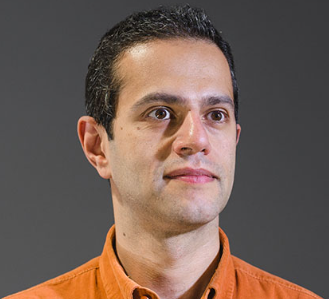PRG Seminar Series
on
Robotics and Computer Vision
Two Talks on Dec 8
Developmental Robotics for Language Learning, Trust and Theory of Mind
and
Number Understanding Modelling in Behavioural Embodied Robotic Systems (NUMBERS)
Two Talks on Dec 8
Developmental Robotics for Language Learning, Trust and Theory of Mind
Developmental Robotics for Language Learning, Trust and Theory of Mind
and
Number Understanding Modelling in Behavioural Embodied Robotic Systems (NUMBERS)
Thursday, Dec 8, 2022
Time: 10:30 AM - 12:00 PM
Room IRB 4105
Zoom Link
by

|
|
|---|
and

|
|
|---|
Developmental Robotics for Language Learning, Trust and Theory of Mind
10.30AM to 11.00AM
10.30AM to 11.00AM
ABSTRACT
Growing theoretical and experimental research on action and language processing and on number learning and gestures clearly demonstrates the role of embodiment in cognition and language processing. In psychology and neuroscience, this evidence constitutes the basis of embodied cognition, also known as grounded cognition (Pezzulo et al. 2012). In robotics and AI, these studies have important implications for the design of linguistic capabilities in cognitive agents and robots for human-robot collaboration, and have led to the new interdisciplinary approach of Developmental Robotics, as part of the wider Cognitive Robotics field (Cangelosi & Schlesinger 2015; Cangelosi & Asada 2022). During the talk we will present examples of developmental robotics models and experimental results from iCub experiments on the embodiment biases in early word acquisition and grammar learning (Morse et al. 2015; Morse & Cangelosi 2017) and experiments on pointing gestures and finger counting for number learning (De La Cruz et al. 2014). We will then present a novel developmental robotics model, and experiments, on Theory of Mind and its use for autonomous trust behavior in robots (Vinanzi et al. 2019, 2021). The implications for the use of such embodied approaches for embodied cognition in AI and cognitive sciences, and for robot companion applications will also be discussed.
ABOUT THE SPEAKER
Angelo Cangelosi is Professor of Machine Learning and Robotics at the University of Manchester (UK) and co-director of the Manchester Centre for Robotics and AI. He also is Turing Fellow at the Alan Turing Institute London, Visiting Professor at Hohai University, and Visiting Distinguished Fellow at AIST-AIRC Tokyo. His research interests are in cognitive and developmental robotics, language grounding, human robot-interaction and trust, and robot companions for health and social care. Overall, he has secured over £35m of research grants as coordinator/PI. Cangelosi has produced more than 300 scientific publications. Cangelosi is Editor of the journals Interaction Studies and IET Cognitive Computation and Systems, and in 2015 was Editor-in-Chief of IEEE Transactions on Autonomous Development. His book “Developmental Robotics: From Babies to Robots” (MIT Press) was published in January 2015, and recently translated in Chinese and Japanese. His latest book “Cognitive Robotics” (MIT Press), coedited with Minoru Asada, was recently published in 2022.
Number Understanding Modelling in Behavioural Embodied Robotic Systems (NUMBERS)
11.15AM to 11.45AM
11.15AM to 11.45AM
ABSTRACT
Number knowledge can be initially boosted by embodied strategies, such as the use of fingers. This talk presents recent research that explores the perceptual process of grounding number symbols (spoken and written digits) in artificial agents, particularly the iCub robot - a child-like humanoid with fully functional five-fingered hands. Several neural network models will be presented in the context of developmental neurorobotics, where the training information is likely to be gradually acquired while operating rather than being abundant and fully available as in traditional machine learning scenarios. The experimental analyses show increased efficiency of the training and similarities with studies in neurophysiology and developmental psychology. These pioneering studies provide valuable information about the simulation of artificial learning and show the value of the cognitive robotics approach to study aspects of abstract cognition. These findings suggest a novel way for the humanization of artificial intelligence's training strategies, where the embodiment can make the robot's learning more efficient and understandable for humans.
ABOUT THE SPEAKER
Alessandro Di Nuovo is Full Professor of Machine Intelligence at Sheffield Hallam University. He received the Laurea (MSc Eng) and the PhD in Informatics Engineering from the University of Catania, Italy, in 2005 and 2009, respectively. At Present, Prof. Di Nuovo is the leader of Technological and Digital Innovation for promoting independent lives at the Advanced Wellbeing Research Centre. He is also the leader of the Smart Interactive Technologies research laboratory of the Department of Computing. He is a member of the Executive Group of Sheffield Robotics, an internationally recognized initiative of two Sheffield Universities to support innovative and responsible research in robotics. Prof. Di Nuovo has a track-record of externally funded interdisciplinary research and innovation in AI and robotics; he has led several large collaborative research projects funded by the European Union, UK Research Councils, charities and large industries. His current project include the MSCA ETN PERSEO on Personalised Robotics as Service Oriented Applications (2021-2024) and the EPSRC NetworkPlus EMERGENCE: Facilitating the Emergence of Healthcare Robots from Labs into Service (2022-2025). He has published over 120 articles in computational intelligence and its application to cognitive modelling, human-robot interaction, computer-aided assessment of intellectual disabilities, and embedded computer systems. Currently, Prof. Di Nuovo is editor-in-chief (topics AI in Robotics; Human Robot/Machine Interaction) of the International Journal of Advanced Robotic Systems (SAGE). He is also serving as Associate Editor for the IEEE Journal of Translational Engineering in Health and Medicine.